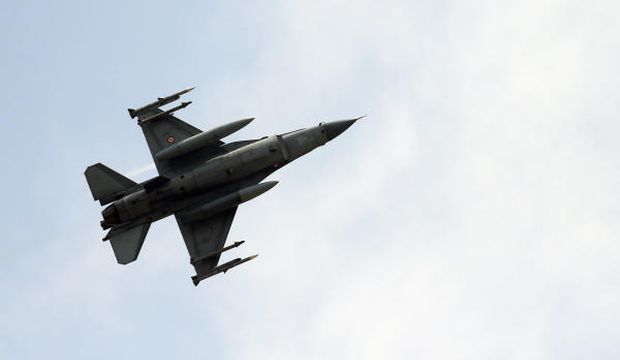
A missile-loaded Turkish Air Force warplane takes off from the Incirlik Airbase, in the outskirts of the city of Adana, southeastern Turkey, on July 28, 2015. (AP Photo/Emrah Gurel)
Jeddah and Istanbul, Asharq Al-Awsat/Reuters—Saudi Arabia on Tuesday said it supports Turkey’s right to defend itself against terrorist attacks, according to the Saudi Press Agency.
Saudi Arabia’s King Salman Bin Abdulaziz said during a telephone call to Turkish President Recep Tayyip Erdoğan on Tuesday that terrorist groups such as the Islamic State of Iraq and Syria (ISIS) “constitute a danger to the region and the world’s safety and security, and must be eliminated.”
Saudi Arabia has like Turkey also recently been the victim of ISIS-linked terror attacks, and King Salman told President Erdoğan the Kingdom supported Ankara’s right to defend itself and its people against such groups.
Erdoğan also briefed King Salman on the details of Turkey’s latest offensive against ISIS in Syria.
The latest wave of airstrikes by Turkey against ISIS began last Friday and also coincide with strikes targeting the Kurdistan Workers Party (PKK) in northern Iraq.
Turkish jets launched their heaviest assault on the Kurdish militants overnight since airstrikes began last week, hours after Erdoğan said a peace process had become impossible.
The strikes hit PKK targets including shelters, depots and caves in six areas, a statement from Prime Minister Ahmet Davutoğlu’s office said. A senior official told Reuters it was the biggest assault since the campaign started.
Iraq condemned the airstrikes as a “dangerous escalation and an assault on Iraqi sovereignty,” saying it was committed to ensuring militant attacks on Turkey were not carried out from within its territory.
Davutoğlu has called the near-simultaneous strikes against PKK camps in Iraq and ISIS fighters in Syria a “synchronized fight against terror.”
NATO member Turkey has also opened up its airbases to the US-led coalition against ISIS, joining the frontline in the battle against the jihadists after years of reluctance. NATO gave Turkey its full political support on Tuesday.
Turkish officials have said the strikes against the PKK are a response to increased militant violence in recent weeks, including a series of targeted killings of police officers and soldiers blamed on the Kurdish militant group.
On Tuesday, fighter jets also bombed PKK targets in the southeastern Turkish province of Şırnak, bordering Iraq, after an attack on a group of gendarmes.
The PKK has said the strikes are an attempt to “crush” the Kurdish political movement and create an “authoritarian, hegemonic system” in Turkey.
It has stopped short of explicitly pulling out of a peace process, although it said on July 11 that Turkey’s construction of military outposts, dams and roads for military use had violated a ceasefire and that it planned to resume attacks.
Erdoğan initiated negotiations in 2012 to try to end the PKK insurgency, largely fought in the predominantly Kurdish southeast and which has killed 40,000 people since 1984. The ceasefire, though fragile, had been holding since March 2013.
Western allies have said they recognize Turkey’s right to self-defense but have urged it not to allow years of peace efforts with the PKK to collapse. While deeming the group a terrorist organization, Washington also depends heavily on allied Syrian–Kurdish fighters battling ISIS.
But on Tuesday, Erdoğan said the process had become impossible and urged parliament to strip politicians with links to the militants of immunity from prosecution.
